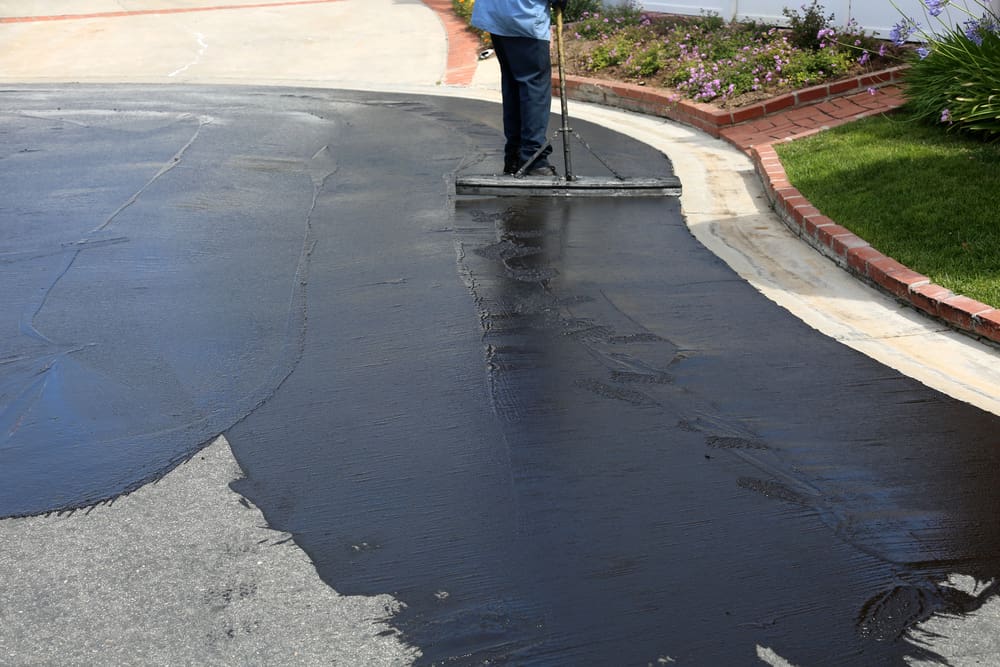How Often Should You Seal Your Asphalt Driveway?

Asphalt driveways are a popular choice for many homeowners and businesses due to their durability and affordability. But, like all outdoor surfaces, they require regular maintenance to maintain their functionality and appearance. One of the most important maintenance tasks is sealing your asphalt driveway. But how often should asphalt be sealed?
Let us walk you through the factors that affect sealing frequency, the benefits of sealing, and how to know when it is time for another layer.
What Is Asphalt Sealcoating?
Before we get into the frequency of sealing, it is important to understand what asphalt sealcoating is. Sealcoating is a protective layer applied to asphalt surfaces. It acts as a shield against elements like rain, snow, and UV rays. Sealcoating helps prevent damage from water, oil, and chemicals, which can break down the surface over time. It also improves the appearance of your driveway by giving it a rich, black finish.
Why Is Sealcoating Important?
Over time, the asphalt surface can become porous, allowing water, dirt, and debris to seep in. This can cause cracks, potholes, and other forms of deterioration. Sealcoating services protect your asphalt from these elements. By creating a smooth and protective surface, sealcoating prevents further damage and extends the lifespan of your driveway. Additionally, it makes cleaning easier and adds to the curb appeal of your property.
How Often Should Asphalt Be Sealed?
The general rule of thumb is to seal your asphalt driveway every two to three years. However, there are several factors that can influence how often you should seal your driveway. These factors include the weather conditions in your area, the amount of traffic your driveway sees, and the age of the asphalt. Below are some specific circumstances that might affect your sealing schedule.
Climate and Weather Conditions
Weather plays a big role in how often your asphalt driveway should be sealed. If you live in an area with extreme weather conditions, such as freezing winters and hot summers, you may need to seal your driveway more often. Freeze-thaw cycles can cause the asphalt to crack, and intense heat can cause the surface to soften and deteriorate. In areas with moderate climates, you may be able to go longer between sealing sessions.
High Traffic Areas
The more traffic your driveway experiences, the more wear and tear it will undergo. If you have a high-traffic driveway, from vehicles, foot traffic, or heavy equipment, you may need to seal your asphalt more often. Commercial asphalt paving projects, such as those used for parking lots or driveways that handle large trucks or heavy machinery, generally require more frequent sealing to maintain their integrity.
Age of the Asphalt
Older asphalt driveways often require more frequent sealing. As the surface ages, it becomes more susceptible to damage from the elements. If your driveway is more than 10 years old, you may need to consider sealing it every one to two years to keep it protected. Newer driveways, on the other hand, only need sealing every three years or so, as long as they are well-maintained.
Signs It is Time to Reseal
It is not always easy to know when it is time to reseal your driveway. Here are some signs that indicate your asphalt needs attention:
- Visible cracks: If you notice cracks or small holes forming, it is time to reseal.
- Fading color: A fading, dull appearance indicates that the protective layer has worn off.
- Water pooling: If water begins to pool in certain spots, the surface is no longer as resistant to water as it should be.
- Stains: Oil, gas, or other stains that do not wash away easily can damage your asphalt over time, making sealing necessary.
How to Seal Your Asphalt Driveway
Sealing your driveway is a straightforward process, but it requires some preparation. First, make sure your driveway is clean and free of debris. Sweep or pressure wash the surface to remove dirt, leaves, and other contaminants. If there are any cracks, fill them in with crack filler before applying the sealant. Once the surface is clean and dry, apply the sealant evenly using a sprayer or a squeegee. Allow the surface to cure for at least 24-48 hours before using the driveway.
Benefits of Professional Sealcoating Services
While DIY sealcoating is an option, hiring professionals guarantees that the job is done right. Sealcoating services from a professional company can save you time and hassle. They have the tools and experience needed to apply the sealant evenly and efficiently. Professional sealcoating also lasts longer, as they use high-quality materials that are specifically designed for your driveway’s needs.
At Kansas City Asphalt, we offer expert sealcoating services that help extend the life of your driveway and keep it looking its best. Our team makes sure that the job is completed to the highest standard, offering lasting protection against the elements.
Cost of Sealcoating
The cost of sealcoating can vary depending on the size of your driveway, the condition of the asphalt, and whether you choose to do it yourself or hire professionals. On average, sealcoating costs between $0.10 to $0.25 per square foot if you hire a professional. While this may seem like an additional expense, the investment is worth it when you consider how much you are extending the life of your driveway.
How to Maintain Your Sealed Asphalt Driveway
Once you have sealed your asphalt driveway, proper maintenance will help you get the most out of your investment. Keep your driveway clean by regularly sweeping or washing it. If you notice any cracks or damage, repair them immediately to prevent further deterioration. Also, avoid parking heavy vehicles on your driveway for extended periods, as this can lead to indentations and damage to the sealed surface.
So, how often should asphalt be sealed? The general recommendation is every two to three years, but this can vary based on factors like climate, traffic, and the age of the driveway. Regular sealcoating helps protect your asphalt driveway from the elements and extends its lifespan. If you are unsure about when it is time to seal your driveway, or if you need help with the process, Kansas City Asphalt is here to help. Our team specializes in asphalt paving and sealcoating services, making sure your driveway stays in top condition for years to come.
